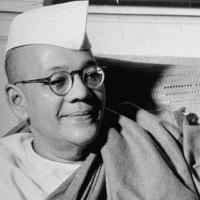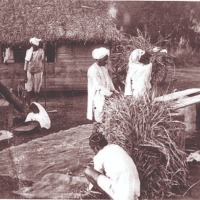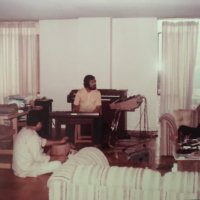In this series of articles, Cuckoo News documents the revival of a musical genre, Bangla Khayal, by a musical genius, Kabir Suman.

February 21, 1952. Dhaka (capital city of then East Pakistan, now Bangladesh). Since nine in the morning, hundreds of youth, namely students of Dhaka University, began gathering in the university premises, demanding that Bengali be accorded the status of one of the official languages of Pakistan. Ever since 1948, a year after Partition, when the authoritarian administration based in West Pakistan declared Urdu as the only official language of the newly-formed Pakistan, protests had erupted in the eastern province and continued unabated. After all, East Pakistan, carved out of the Indian state of Bengal was the domain of the people whose mother tongue was Bengali, the rich, sophisticated and ancient language which had suffered enough indignity in the hands of the dominant regime in West Pakistan. Indeed, to crush dissent, the administration had imposed a law which barred gatherings of more than four people in one place. But Bengalis had had enough.
On February 21, 1952, students defied orders and gathered in large numbers. They tried to break barricades and were brutally attacked with tear gas. Several were arrested. Eventually when a group of students attempted to enter the legislative assembly in order to place their demands before the law makers, police opened fire, killing five young boys and injuring hundreds. By the time the sun set painting the western horizon of the eastern land red, the East, now reddened with the anger and blood of its martyrs, had decided to break free from the West. Indeed, it was the start of the war for liberation and nineteen years later and after much more blood was spilled, East Pakistan was freed from the clutches of West Pakistan and became Bangladesh.
February 21, has been etched in the memory of Bengalis as the day of martyrs. It has officially become known as Bengali Language Day and since 2000 it has been recognized as International Mother Language Day by the United Nations.

In spite of its victories, however, the Bengali language still faces challenges in many ways. Fortunately, however, there are crusaders.
And Kabir Suman is one of them. The musician has made it his life’s sole goal to ensure that Bengali is included in the list of languages in which Khayal, a genre of vocal Indian classical songs, is rendered.
“There are currently at least ten languages of the Indian subcontinent in which Khayal is sung,” says Kabir. And he rues that Bengali is not one of them. He talks about the resistance by purists. In his lively, generously humorous, live performances, interspersed with dialogue and wisdom that he intermittently conducts on social media, especially Facebook, Kabir shares anecdotes that reveal the magnitude of such resistance.
One of Kabir’s favorite stories, which he narrates with a great deal of satisfaction and mirth, is how a revered Bengali musician of the 1950s and 1960s, Satya Kinkar Bandyopadhyay, chose a live radio program to start singing a Bengali Khayal song, knowing full well that the producers wouldn’t be able to stop him in the middle of it. “If it was a recording, they could have stopped him,” Kabir chuckles. Aghast, when the producers demanded to know, after the program, why he sang in Bengali, Satya Kinkar apparently asked them to show him rulebooks which barred renditions of Khayal in Bengali. They could not of course. In fact, when a few weeks later the then central minister for Information and Broadcasting arrived in Kolkata, journalists asked him his views on Bengali Khayal. The minister said he thought there was nothing wrong with it. Kabir marvels at the sheer determination of Satya Kinkar Bandyopadhyay, who not only thus fought for Bengali Khayal but managed to extract a contract from the same national radio station for several renditions of Bengali Khayal. Kabir says he is unsure if all the scheduled programs could take place as planned but Satya Kinkar died soon after.
Kabir Suman has revived the fight. He has not only been writing lyrics in Bengali and weaving them into the structures of a range of ragas but he has been lobbying with authorities for recognition of Bengali as a legitimate language for singing Khayal. “Since my childhood, when I started learning and practicing classical vocal music, I had found it strange that I had to sing songs the language of which I just could not understand. The words made no sense to me and so I often asked my teacher to explain. I found it disturbing that if I wanted to sing classical vocal it would have to be in a language which I could neither speak nor understand. I found it disturbing that I could not sing in my own language.”
Kabir finally found the support he was looking for. His appeals to the state government did not fall on deaf years. West Bengal chief minster Mamata Banerjee, was listening.
In 2018, Kabir was granted permission to conduct four workshops in Bengali Khayal. But what surpassed even his own optimistic expectations and in what Kabir calls a “historic moment for Bengali Khayal”, his appeals to the state government for initiating regular classes for teaching Bengali Khayal was heard and he was given the green signal to proceed.
On February 19, 2021, Kabir Suman conducted the first-ever lesson in Bengali Khayal at the Poshchim Bongo Rajya Sangeet Academy (West Bengal State Music Academy) in Kolkata’s New Town. “I am feeling delighted and overjoyed,” said a beaming Kabir, who will be taking the classes once a week, which are being sponsored by the state government. The first batch included 26 students, who were not just from Kolkata but also the distant districts, including Bankura, near the border with the state of Jharkhand . “They travelled all the way just to learn Bengali Khayal,” Kabir says emotionally. “I have no words to express my gratitude to Mamata Banerjee,” he says, “because without her help this would not have been possible.” Kabir does however find words to pen down a song for the day. He composed lyrics to be set in the Raga Bhoirob to teach the students.
Indeed on International Mother Language Day, it is another victory for our beloved mother tongue, Bengali.
Categories: Music








